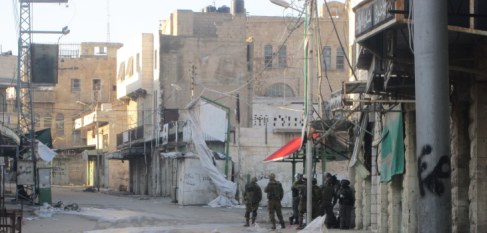by Kathleen Kern
[Note: The following first appeared on the CPT Palestine blog in a slightly condensed form ]
Years ago in our Hebron apartment, we had a foam cushion insert on which someone had drawn a smiling face. We dubbed it “Happy Foam Square,” and would throw it at a wall when our work got frustrating. Doing so was surprisingly cathartic.
So in a small way, I understand why throwing stones feels good. I also understand, when I see the posters of small boys throwing stones at tanks, that their actions are brave. I understand why the narrative of an occupied people resisting one of the most technologically advanced militaries in the world with rocks and Molotov cocktails is a source of pride in some circles.
But monitoring clashes in Hebron has always been one of my least favorite things to do, because we have almost no impact on the situation, and so little strategy is involved on the part of the Palestinian boys throwing things. They do it because it feels good, because it helps take the edge of the humiliation of the Israeli military occupation, and they just don’t think about the consequences to themselves, their families, or the people living and working in the staging area for these clashes.
In some situations, a thrown stone can literally grant a soldier a license to kill or can result in months, even years in jail for Palestinian youth. We have seen boys as young as eight taken away on suspicion of stone throwing. (Israeli settler youth are never arrested for throwing stones at Palestinians.) In one case, I witnessed soldiers detain children because they were wearing balaclavas in the cold weather; they told me the masks proved the boys were intending to throw stones (For more information on what happens to children accused of throwing stones, see Occupied Childhoods. Newly released report on violation of children’s rights in Hebron.)
On school days, we monitor two checkpoints through which students and teachers must walk to get to school. At one checkpoint, almost every day, schoolboys throw stones at Border Police and Border Police respond with tear gas and sound bombs. One young mother told me, exasperated, “If they weren’t here, the boys would not throw stones.” And it’s true. If the soldiers, for the fifteen minutes before the school bell rang just went around the corner, had a cup of coffee, and let the principals shoo the children into the schoolyards, this dreary daily theatrical production would not take place.
Stone throwing at the Qitoun checkpoint happens less often, but last week, it had a tragic consequence for a family in the line of fire. After a volley of stones lasting less than a minute, a Border Police officer shot tear gas from a nearby rooftop at the boys. He missed, and it went into a family’s home and caught something on fire. They lost everything.
So do I think Palestinian children should stop throwing stones? Of course. Apart from my own pacifist beliefs, I see it having no positive outcomes for the children and teenagers. But there is a reason that societies hold adults more responsible than children for their negative actions, and the soldiers firing the teargas and rubber bullets at stone throwers are at least nominal adults. And the strategists running this stupid, immoral occupation passed the threshold of adulthood a long, long time ago.






















































You must be logged in to post a comment.